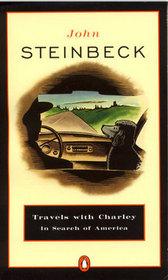As I often do, I read this book because it was a school assignment for my son. I like to have an idea what the kids are reading in school. I might not have chosen this book otherwise (although I remember being a big fan of The Grapes of Wrath).
Overall, Steinbeck has put together a travel log/journal. He visited some neat places, while dealing with a pet that needed medical care and blocked him from getting in to Canada.
I was looking for something deeper from Steinbeck with "In Search of America" in the title. I don't feel like he ever really said what he found in America besides a bunch of geographically and culturally diverse regions (which I suppose is, indeed, America). Overall, this book falls flat to me in defining our current national identity.
I wouldn't recommend this book - and, struggle with why it should be required reading for students.
Most enjoyable travelogue telling the story of Steinbeck's 1960 trip with his dog, Charley, in a camper on a pickup truck named Rocinante, after the horse of Don Quixote, to rediscover America. I've been meaning to read this for several years and happened upon a used paperback copy at a local thrift store. This copy was obviously a high school student's who had been assigned to read this in school. It was a copy from 1966 full of underlines and notes -- I seem to recall that my older sister read this as a school assignment about that same time. Steinbeck is one of my favorite authors and I would place this narrative near the top of his works (after Grapes of Wrath and East of Eden). Steinbeck took this trip to see for himself what America was like at that time and how it had changed from his earlier years. The book is full of wonderful descriptions of different locations and observations of people and places. The trip took about 3 months and Steinbeck had to deal with some issues related to his truck including a blowout in the middle of nowhere, issues with his sick dog, and some confrontations with people although overall he found most Americans to be friendly and individuals.
Along the way, he revisited his boyhood home of Salinas, California, and pretty much agreed with Thomas Wolfe, that "you can't go home again." He states you can't go home again because home has ceased to exist except in the mothballs of memory. When I went away, I had died in my friends' memory. My return caused only confusion and uneasiness. Having recently returned to my home in Utah after being gone for over 25 years, I can definitely relate to Steinbeck's sentiments. Home is not like it was in my memories.
Towards the end of Steinbeck's travels, he goes through the deep South and witnesses some of the demonstrations and rioting relating to trying to desegregate the schools. This was in 1960 during the early strife of the Civil Rights movement in the South. Steinbeck was appalled by what he saw and the attitudes towards African-Americans. I believe this really left a bitter taste in his mouth and his journey ended shortly after that even though he wasn't quite back to his home in New York.
Overall, I would highly recommend this book to anyone who wants a glimpse into the America of the 1960s.
Steinbeck and his dog, Charley, traveled across the country in the early 1960's. Reading of his adventures is a little like looking at photographs from that time. Because of that, the book can seem a little dated. However, as one experiences North Dakota, Yellowstone, and the redwoods of California with Steinbeck and Charley, the photos seem to come alive. When Steinbeck gets to Texas and the Deep South his insights into time and place are truly eye opening.
This book will make you think. Steinbeck packs up his dog, Charley, and together they set out from NY to CA "in search of America". He's very introspective of his own life and of his fellow Americans as he journeys along local roads, avoiding freeways if at all possible, because he feels he will miss too much of the local life otherwise. He connects with the locals, and as the book progresses, seems to understand himself more. While he's very detailed, it's not at all boring. Definitely one to read.
very interesting stories about the 'real' America
It was very interesting to read about a journey that started a month before my birth but held many truths that still apply. I thoroughly enjoyed his turn of a phrase.
Steinbeck, oh how I love thee. I think John and I would have been good friends.
Profound, sympathetic, often angry. An honest moving book by one of our great writers.




![header=[] body=[Get a free book credit right now by joining the club and listing 5 books you have and are willing to share with other members!] Help icon](/images/question.gif?v=52444873)
